TASK 1
1) Key characteristics of the project
The present project discusses regarding ABC which has been able to has a successful mergers and acquisitions. It has already been able to bring various brands into control. ABC is now planning to acquire DEF Ltd. which is the frozen food retailer and have variety of outlets in all major cities and town of UK. The responsibility of handling acquisition is given to John, where he is responsible for handling acquisition project management function with the help of external consultants. In order to proceed with this project management, it is required to indulge in to planning, implementation and termination of this acquisition project. It will help in ensuring that project is initiated in effective manner which will thereby result in withdrawing successful profitability through it (Bassi and et.al., 2017).
2) Scope of the project and Work breakdown Structure (WBS) for it
The scope of the project is quitter wide as ABC is planning to enhance its area by acquiring an organization which deals in frozen food. It will help in enhancing the profitability and market share aspects of ABC ltd. Scope of the project helps in creating unique deliverables by preparing specific as well as achievable aim and objectives of the project. It helps in understanding the boundaries of project and analyse the role of stakeholders in each and every step.
Work breakdown structure is one of the key project deliverable that helps in organizing work of the team into various manageable sections (Eskerod, Huemann and Savage, 2015). It is required to be executed by project team so as to have maximum amount of profitability out of it.
3) Gantt Chart and identification of critical path
|
Task Mode |
Task Name |
Duration |
Start |
Finish |
Predecessors |
|
Auto Scheduled |
Assessment of aim and objectives |
5 days |
Wed 06/13/18 |
Tue 06/19/18 |
|
|
Auto Scheduled |
Initiating project |
4 days |
Wed 06/20/18 |
Mon 06/25/18 |
1 |
|
Auto Scheduled |
Analyzing feasibility |
2 days |
Tue 06/26/18 |
Wed 06/27/18 |
2 |
|
Auto Scheduled |
Collection of resources |
3 days |
Tue 06/26/18 |
Thu 06/28/18 |
2 |
|
Auto Scheduled |
Completion of project |
5 days |
Thu 06/28/18 |
Wed 07/04/18 |
3 |
|
Auto Scheduled |
Project Closure |
7 days |
Fri 06/29/18 |
Mon 07/09/18 |
4 |
|
Tasks |
1 |
2 |
3 |
4 |
3 |
5 |
6 |
7 |
8 |
9 |
10 |
11 |
12 |
13 |
14 |
15 |
16 |
17 |
18 |
19 |
20 |
21 |
22 |
|
Assessment of aim and objectives |
- |
- |
- |
- |
- |
||||||||||||||||||
|
Initiating project |
- |
- |
- |
- |
- |
- |
|||||||||||||||||
|
Analyzing feasibility |
- |
- |
|||||||||||||||||||||
|
Collection of resources |
- |
- |
- |
||||||||||||||||||||
|
Completion of project |
- |
- |
- |
- |
- |
||||||||||||||||||
|
Project Closure |
- |
- |
- |
- |
- |
- |
- |
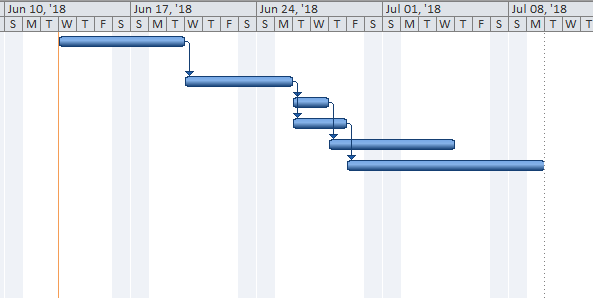
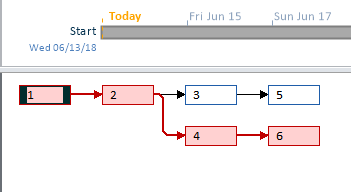
4) Approaches to initiate a budget
Researchers have stated that project budgeting is one of the most important aspect when opting for any type of project. It is the financial aspect that is attached to it which ultimately helps in determining overall feasibility of the project ad assess cost benefit ratio attached to it as well. It also has greater emphasis on estimates of cost which can help in planning expenditure aspect also (Lyapina and et.al., 2017). There are various elements that are required to be taken into consideration. These can be in the form of following:
Direct Cost
- Labour
- Material
- Travel expenses
- Training program
Indirect Cost
- Office and general administration expenses
- Communication expenses
- Insurance charges
Considering these expenses, while preparing budget, helps in analysing various types of risks that are involved in the project. Further, estimated expenses can be decided based on it.
5) Rise of project risk and various responses to it
A unique aspect of the project which not be directly related to it but have adequate role in deciding successful implementation is related to leadership and administration. Further, analysing these issues helps in deciding that whether project will appropriately be implemented or not. Risks in the project are also identified so as to ensure that all the important aspects are taken into consideration and there is no existence of any negative impact on overall outcomes of the project. There can be various types of risks in the project. These are, risk of scope, which may occur due to addition of new requirements in the project. Another risk is related to scheduling which is related to error in estimation and unidentified delays (Bresnen, 2016). Resource risk is another type of risk involved in the project where the team may not be able to manage essential resources to serve the requirements of project. In the end, technological risk can also be faced which may arise due to machinery or computer system defects.
The team can manage these risks by preparing better project management report and considering all the important aspects that are related to it. Risk can also be transferred to third party so that it can be handled effectively.
6) Implementation of quality control methods on the project
Quality plays a significant role in project management as it helps in ensuring that appropriate deliverables are ultimately achieved by the team. There are various tools and techniques that are used to measure and corrective actions that can be taken by the team for effective output. It also helps in ensuring that the ultimate quality of deliverables is able to meet expectations of the team. Some of these methods are mentioned as follows:
- Trend monitoring: It helps in matching estimated cos, resources and schedules with the of actual ones.
- Documentation control: It assist in finding out that which all documents and information are important so as to reach to relevant as well as decided outcomes.
- Acquisition: It plays substantial role in process of acquisition of project equipment, which are in the form of raw material and other related resources (Calvo-Mora, Navarro-García and Periañez-Cristobal, 2015).
- Specification control: It helps in preparing review of deliverables which helps in analysing that whether quality requirements are being met or not.
Some important quality control tools are, check sheets, control charts, work flow chart and inspection.
TASK 2
Executive summary
The main aim of this project is to smoothen the process of acquisition. In the present scenario, ABC Ltd. is planning to acquire DEF Ltd which will help in enhancing overall scope of the business. Hence, operational analysis will be conducted so as to ensure that project can be implemented in a well-defined manner. Project management have discussed regarding budget of the project, communication plan and various phases of underlying project initiated by ABC Ltd. These five phases of project are, Initiating, Planning, Executing, Monitoring and Controlling and Closing. There are various tools and techniques that are used by project managers for its effective implementation. These are, scope, cost and schedule which hold adequate amount of relevance in project management.
Introduction
Project management plays an important role in finding out that whether overall project will be able to deliver as per its objectives and desired outcomes or not. The present report aims at analysing acquisition project which is taking place between ABC Ltd and DEF Ltd. The report makes an assessment of Work breakdown Structure (WBS) and Gantt Chart which include all the activities. The overall framework of project management inclusive of all the elements will be included in it. These are, Initiating, Planning, Executing, Monitoring and Controlling and Closing.
Work breakdown Structure
Work breakdown structure helps in allocating expected time which will help in completing all the deliverables related to project. It is considered to be one of the key basis based on which overall project is designed. Further, it plays a substantial role in achieving overall objectives of the project being framed by the project manager also. Work breakdown Structure for the particular project has been prepared as follows:
|
Deliverables |
Task Name |
Completion time |
|
Deliverable 1 |
Pre-Initiating phase |
15 |
|
Deliverable 2 |
Project feasibility phase |
13 |
|
Deliverable 3 |
Initiating project phase |
4 |
|
Deliverable 4 |
Planning phase |
28 |
|
Deliverable 5 |
Execution |
5 |
|
Deliverable 6 |
Monitoring and controlling phase |
11 |
|
Deliverable 7 |
Closing |
2 |
Project Budget
|
Particulars |
Amount ( In GBP ) |
|
Working space |
1500 |
|
Land and building |
2500 |
|
Purchase of machinery |
2000 |
|
Equipment cost |
2000 |
|
Freezers |
1000 |
|
Cost of machinery |
800 |
|
Human resource salary |
2000 |
|
Labour |
1000 |
|
Material |
2500 |
|
Training and development |
3000 |
|
Travel and transportation |
2000 |
|
Total |
20,300 |
There are various objectives that have been considered while preparing the above budget. Some of them are mentioned below:
- To finish off the project within budgetary monetary limit, that is of 20,300 and all the functions which require certain monetary transactions can be considered.
- To bring acquisition in the best possible manner that can help in initiating adequate profitability in the company.
- To monitor all departments, that are, Finance, HR, Operations, Sales, etc.
- To generate numerous performance reports so as to initiate effective functioning.
Gantt Chart
|
Task Name |
Duration |
Start |
Finish |
Predecessors |
WBS |
|
Pre-Initiating phase |
15 days |
Wed 06/13/18 |
Tue 07/03/18 |
1 |
|
|
Defining scope of the project |
2 days |
Wed 06/13/18 |
Thu 06/14/18 |
1.1 |
|
|
Analyzing stakeholders |
3 days |
Fri 06/15/18 |
Tue 06/19/18 |
2 |
1.2 |
|
Defining objectives of the project |
6 days |
Wed 06/20/18 |
Wed 06/27/18 |
3 |
1.3 |
|
Communicating objectives to team members |
4 days |
Thu 06/28/18 |
Tue 07/03/18 |
4 |
1.4 |
|
Project feasibility phase |
13 days |
Wed 06/13/18 |
Fri 06/29/18 |
2 |
|
|
Analysis of economic feasibility |
2 days |
Thu 06/28/18 |
Fri 06/29/18 |
4 |
2.1 |
|
Defining budget |
3 days |
Wed 07/04/18 |
Fri 07/06/18 |
5,7 |
2.2 |
|
Assessing operational feasibility |
1 day |
Mon 07/09/18 |
Mon 07/09/18 |
8 |
2.3 |
|
Analyzing funding feasibility |
2 days |
Tue 07/10/18 |
Wed 07/11/18 |
9 |
2.4 |
|
Assessment of Technical feasibility |
3 days |
Mon 07/02/18 |
Wed 07/04/18 |
7 |
2.5 |
|
Defining requirement of resources |
2 days |
Thu 07/12/18 |
Fri 07/13/18 |
10,11 |
2.6 |
|
Initiating project phase |
4 days |
Wed 06/13/18 |
Mon 06/18/18 |
3 |
|
|
Development of project charter |
2 days |
Mon 07/16/18 |
Tue 07/17/18 |
12 |
3.1 |
|
Identification of stakeholders |
2 days |
Wed 07/18/18 |
Thu 07/19/18 |
14 |
3.2 |
|
Planning phase |
28 days |
Wed 06/13/18 |
Fri 07/20/18 |
4 |
|
|
Preparing project management plan |
1 day |
Wed 07/18/18 |
Wed 07/18/18 |
14 |
4.1 |
|
Plan Scope Management |
2 days |
Fri 07/20/18 |
Mon 07/23/18 |
15 |
4.2 |
|
Collection of requirements |
3 days |
Fri 07/20/18 |
Tue 07/24/18 |
15,17 |
4.3 |
|
Defining scope of project |
1 day |
Tue 07/24/18 |
Tue 07/24/18 |
18 |
4.4 |
|
Creation of WBS |
3 days |
Wed 07/25/18 |
Fri 07/27/18 |
19 |
4.5 |
|
Plan and manage schedule |
2 days |
Mon 07/30/18 |
Tue 07/31/18 |
20,21 |
4.6 |
|
Planning schedule management |
1 day |
Wed 08/01/18 |
Wed 08/01/18 |
22 |
4.7 |
|
Defining all the activities involved |
2 days |
Wed 07/25/18 |
Thu 07/26/18 |
20 |
4.8 |
|
Sequencing activities |
3 days |
Mon 07/30/18 |
Wed 08/01/18 |
21 |
4.9 |
|
Estimation of activity resources |
1 day |
Wed 08/01/18 |
Wed 08/01/18 |
22 |
4.10 |
|
Estimation of activity duration |
1 day |
Thu 08/02/18 |
Thu 08/02/18 |
23 |
4.11 |
|
Development of proper schedule |
2 days |
Fri 07/27/18 |
Mon 07/30/18 |
24 |
4.12 |
|
Ensuring quality management |
1 day |
Thu 08/02/18 |
Thu 08/02/18 |
25 |
4.13 |
|
Planning risk management |
2 days |
Thu 08/02/18 |
Fri 08/03/18 |
26 |
4.14 |
|
Identification of risks |
1 day |
Fri 08/03/18 |
Fri 08/03/18 |
27 |
4.15 |
|
Planning risk resources |
2 days |
Tue 07/31/18 |
Wed 08/01/18 |
28 |
4.16 |
|
Execution |
5 days |
Thu 08/02/18 |
Wed 08/08/18 |
5 |
|
|
Directing and managing project work |
3 days |
Fri 08/03/18 |
Tue 08/07/18 |
29 |
5.1 |
|
Performing quality assurance |
2 days |
Mon 08/06/18 |
Tue 08/07/18 |
30 |
5.2 |
|
Acquiring developing and managing project team |
5 days |
Thu 08/02/18 |
Wed 08/08/18 |
32 |
5.3 |
|
managing project team |
2 days |
Thu 08/02/18 |
Fri 08/03/18 |
32 |
5.4 |
|
managing stakeholders input |
1 day |
Wed 08/08/18 |
Wed 08/08/18 |
34,35 |
5.5 |
|
Monitoring and controlling phase |
11 days |
Wed 06/13/18 |
Wed 06/27/18 |
6 |
|
|
Comparing deliverables |
1 day |
Thu 08/09/18 |
Thu 08/09/18 |
36 |
6.1 |
|
Verifying ultimate deliveries |
2 days |
Mon 08/06/18 |
Tue 08/07/18 |
37 |
6.2 |
|
Monitor & Control Project Work & Perform Integrated Change Control |
3 days |
Fri 08/10/18 |
Tue 08/14/18 |
38,40 |
6.3 |
|
Performing control activities |
1 day |
Wed 08/08/18 |
Wed 08/08/18 |
41 |
6.4 |
|
Validating and controlling scope |
2 days |
Wed 08/15/18 |
Thu 08/16/18 |
42 |
6.5 |
|
Controlling quality |
1 day |
Thu 08/09/18 |
Thu 08/09/18 |
43 |
6.6 |
|
Controlling risk |
1 day |
Fri 08/17/18 |
Fri 08/17/18 |
44 |
6.7 |
|
Closing |
2 days |
Wed 06/13/18 |
Thu 06/14/18 |
7 |
|
|
Sign off on deliverables |
1 day |
Mon 08/20/18 |
Mon 08/20/18 |
45,46 |
7.1 |
|
Conclude project |
1 day |
Tue 08/21/18 |
Tue 08/21/18 |
48 |
7.2 |
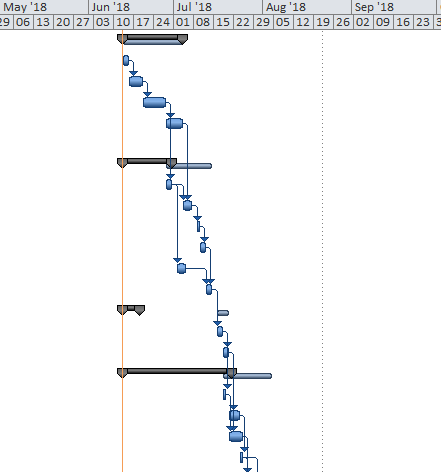
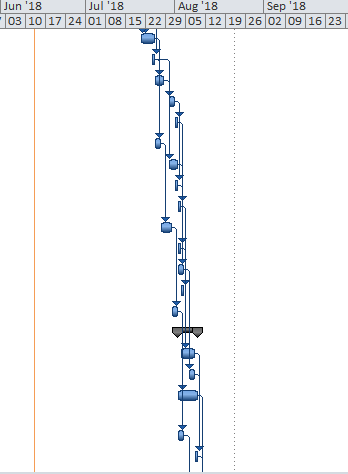
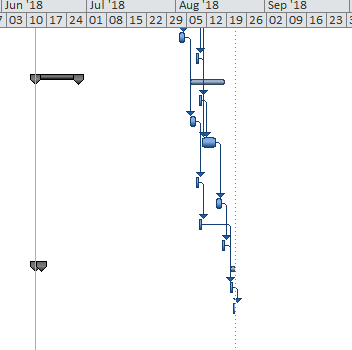
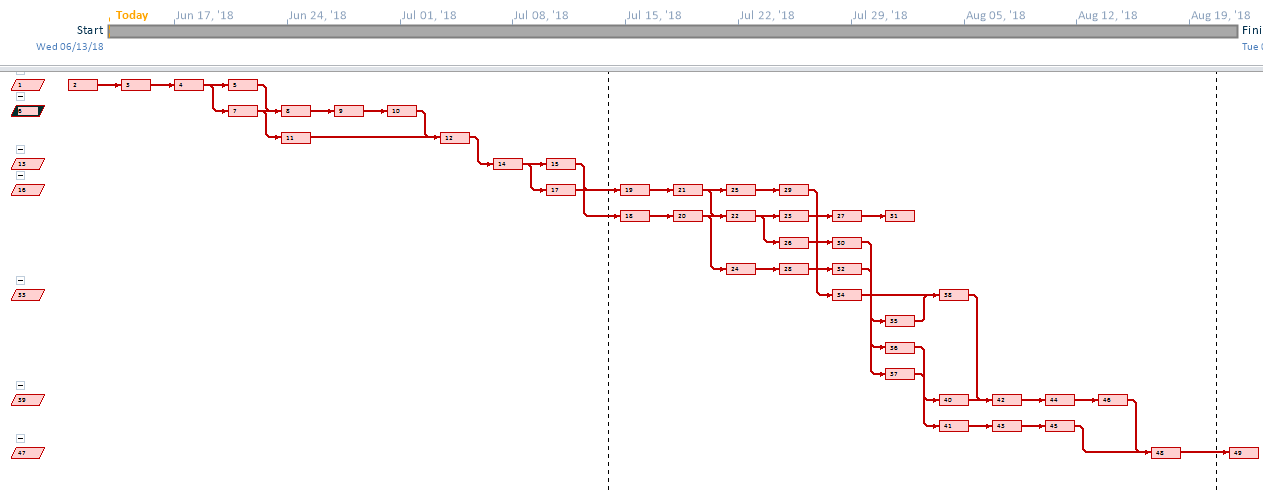
Skills and competencies of Project Manager
It is usual that a project manager has to get involved in cross functional activities as well. Skills possessed by project manager must suit to skills and competencies so that teams and their functions can appropriately be managed by him / her. It also helps in ensuring that all the resources of projects are appropriately being utilized in the project (Eskerod, Huemann and Savage, 2015).
The project manager must have the qualities of preparing vision, integrity, empathy and qualities of sound leadership. He must also carry strong interpersonal as well as communication skills reflecting managerial skills as well. He must have the ability to delegate responsibilities and solve issues that may arise in the business while initiating acquisition. The individual must also carry motivational abilities so that his team can always be kept encouraged and decisions can be made and issues can be sort out promptly.
Project Scope Statement
It is inclusive of all the deliverables that are required to be accomplished by project team at the time of completion of project (Layton and Ostermiller, 2017). It helps in defining what is to be performed and what not to be considered by setting up certain project boundaries, time scale for timely completion of the project. Other aspects that are defined in this area is associated costs, acceptance criteria and budget as well. It helps in eliminating all the doubts that may be carried by people in the team with respect to tasks of the project. Activities that are required to be avoided are also required to be mentioned in the project report while defining scope statement in it. Adequate changes can be brought in scope statement of project during its implementation.
Phases of project management
There are certain phases of project management which are required to be followed by ABC Ltd, while issuing acquisition project of DEF Ltd. These management stages are:
- Initiating
- Planning
- Executing
- Monitoring
- Controlling and Closing
Project initiation phase
This stage helps in defining aim and objectives of the project by mentioning initial scope. Project sponsors ca n be decided by DEF Ltd. It helps in setting out the vision for which plan is initiated to be prepared so that ultimate objectives can be accomplished. It also plays an important role in finding out how feasible the objective is and whether it will be achieved in set time frame or not (McCormick, 2018).
Planning phase
It is one of the most important aspect of project management where project management plan is created. It helps in setting out phases where all the necessary resources are ascertained and gathered so that it does not create any obstacle in implementation of project. The plan also helps in mentioning scope, cost and schedule of the project for better definition. The plan also comprehensively discusses regarding quality, communication, duration, resources and risk that can help in drawing out effective results out of it (Pollack and Adler, 2015). Common tools and methods that are taken into consideration in it include, milestone, budget, WBS, estimation of resource planning, planning and communication dates and Gantt Chart. All the planning activities are prepared based on interest and requirements of the stakeholders. In this scenario, plan for ABC Ltd., while initiating acquisition of DEF Ltd. can have the following stages:
- Financial plan:Since, acquisition will increase overall scope of the business finance can be required to initiated purchase of land and building and machinery so as to serve overall purpose. The total financial budget allotted for the present project is 20,300
- Resource plan: certain equipment and labour will be required by ABC Ltd so as to initiate effective implementation.
- Risk plan: Risk management plan is also required to be prepared by project manager based on all the identified risks which are foreseeable in nature and require response actions to eliminate it impact.
- Staffing plan: There is no requirement of hiring any staff as while performing acquisition all the employees of DEF Ltd can also be absorbed (Vidaud-Barral, Tacnet and Pinet, 2016).
- Communication plan: Bottom up communication approach will be followed by companies after performing acquisition so as to ensure that top level management is not overburdened.
Project Execution phase
At this stage of project, deliverables are implemented that has already prepared in planning phase. It is important that the roadmap prepared is followed by the team for its effective execution. It also helps in determining overall success and failure of the project. It is considered to be an important state where teams are divided which analyse that whether the project will be a success or failure. It also aims at ensuring overall product range that will be offered by ABC Ltd, after acquiring DEF. Merge of departments is also an important aspect that will be initiated. It will help in ensuring all the roles and responsibilities are appropriately being divided and proper working atmosphere has been created.
Monitoring and controlling phase
All the activities that have been implemented and executed are then monitored and controlled so as to analyse that effective outcomes are being generated out of it. In this process, steps, such as, tracking reviewing and benchmarking has been initiated by the project manager (Ika, 2015). The main elements that are considered during this phase are, risks, finances and scope. Controlling aspects related to changing and managing measures can also be taken into consideration for review management. Communication control measure is another aspect to be analysed with necessary security safeguards.
Closing
It is the step where the process is brought to closure after completion of all the aspects. It can only be closed when the outcomes are being accepted by the client, which is indicated as a sign off. The closure aspect is helps in defining the activities in such a manner that overall aim and objectives of the project can ultimately be attained effectively (Pollack and Adler, 2015). There are various elements that are included in final phase of the project. These are, final audit of the project and closing contract. After considering all execution and controlling aspect and final submission inclusive of historical evidence and form a guide for future projects also (Successful deployment of the first SAP ERP project in Myanmar, 2016).
Conclusion
It can be concluded from the above report that, all the tools and techniques related to budget and scope have appropriately being analysed in the project. It is expected that this acquisition process will prove to be successful for both the companies, that are, ABC Ltd and DEF Ltd.
Visit the sample section of website for more informative write-ups written by online assignment help professional
References
Books and Journals
- Bassi, A. and et.al., 2017. Criteria and Factors in the Succes of Projects and their Management–Survey by Swiss Companies. In Management Challenges in a Network Economy: Proceedings of the MakeLearn and TIIM International Conference 2017 (pp. 119-134). ToKnowPress.
- Bresnen, M., 2016. Institutional development, divergence and change in the discipline of project management. International journal of project management. 34(2). pp.328-338.
- Calvo-Mora, A., Navarro-García, A. and Periañez-Cristobal, R., 2015. Project to improve knowledge management and key business results through the EFQM excellence model. International Journal of Project Management. 33(8). pp.1638-1651.
- Eskerod, P., Huemann, M. and Savage, G., 2015. Project stakeholder management—past and present. Project Management Journal. 46(6). pp.6-14.
- Eskerod, P., Huemann, M. and Savage, G., 2015. Project stakeholder management—past and present. Project Management Journal. 46(6). pp.6-14.
- Ika, L.A., 2015. Opening the black box of project management: Does World Bank project supervision influence project impact?. International Journal of Project Management. 33(5). pp.1111-1123.
- Layton, M.C. and Ostermiller, S.J., 2017. Agile project management for dummies. John Wiley & Sons.
- Lyapina, I. and et.al., 2017. Approaches to Organization of Project Management in Russia. In Integration and Clustering for Sustainable Economic Growth (pp. 91-99). Springer, Cham.
- McCormick, K., 2018. Using Rapid Cycle Quality Improvement to Improve Weight Managment in Primary Care.
- Pollack, J. and Adler, D., 2015. Emergent trends and passing fads in project management research: A scientometric analysis of changes in the field. International Journal of Project Management. 33(1). pp.236-248.
- Pollack, J. and Adler, D., 2015. Emergent trends and passing fads in project management research: A scientometric analysis of changes in the field. International Journal of Project Management. 33(1). pp.236-248.
- Vidaud-Barral, L., Tacnet, J. M. and Pinet, F., 2016. Modeling information quality and traceability in risk management and decision processes: Application to mountain natural hazards. Risk, Reliability and Safety: Innovating Theory and Practice: Proceedings of ESREL 2016 (Glasgow, Scotland, 25-29 September 2016). pp.276.














